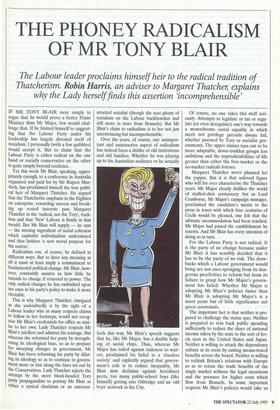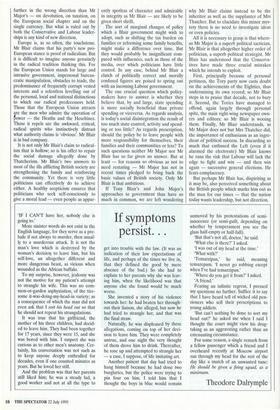THE PHONEY RADICALISM OF MR TONY BLAIR
The Labour leader proclaims himself heir to the radical tradition of Thatcherism. Robin Harris, an adviser to Margaret Thatchet; explains why the Lady herself finds this assertion 'incomprehensible' IF MR TONY BLAIR were simply to argue that he would prove a better Prime Minister than Mr Major, few would chal- lenge that. If he limited himself to suggest- ing that the Labour Party under his leadership has largely divested itself of socialism, I personally (with a few quibbles) would accept it. But to claim that the Labour Party is either radical on the one hand or socially conservative on the other is quite simply beyond credence.
Yet this week Mr Blair, speaking, appro- priately enough, to a conference in Australia organised and paid for by Mr Rupert Mur- doch, has proclaimed himself the true politi- cal heir of Margaret Thatcher. He argued that the Thatcherite emphasis in the Eighties on enterprise, rewarding success and break- tng up vested interests puts Margaret Thatcher in the 'radical, not the Tory', tradi- tion and that 'New' Labour is firmly in that mould. But Mr Blair will supply — he says — the missing ingredient of social cohesion which capitalist individualism undermined and thus fashion 'a new moral purpose for the nation'.
Radicalism can, of course, be defined in different ways. But to have any meaning at all it must at least imply a commitment to fundamental political change. Mr Blair, how- ever, constantly assures us how little he intends to change if returned to power. The only radical changes he has embarked upon are ones in his party's policy to make it more electable.
This is why Margaret Thatcher, intrigued as she undoubtedly is by the sight of a Labour leader who in many respects claims to follow in her footsteps, would not recog- nise Mr Blair's credentials for office as simi- lar to her own. Lady Thatcher respects Mr Blair's intellect and admires his courage. But Whereas she reformed her party by strength- ening its ideological base, so as to prepare for sweeping changes in government, Mr Blair has been reforming his party by dilut- lag its ideology so as to continue in govern- ment more or less along the lines set out by the Conservatives. Lady Thatcher rejects the attempt by the more block-headed Tory Party propagandists to portray Mr Blair as either a cynical charlatan or an unrecon- structed socialist (though she sees plenty of socialism on the Labour backbenches and still more in store from Brussels). But Mr Blair's claim to radicalism is to her not just unconvincing but incomprehensible.
Over the years, of course, one unimpor- tant and unattractive aspect of radicalism has indeed been a dislike of old institutions and old families. Whether he was playing up to his Australian audience or he actually feels this way, Mr Blair's speech suggests that he, like Mr Major, has a double help- ing of social chips. Thus, whereas Mr Major has railed against rudeness to wait- ers, proclaimed his belief in a 'classless society' and explicitly argued that govern- ment's role is to reduce inequality, Mr Blair now declaims against hereditary peers, too many public-school boys (like himself) getting into Oxbridge and an 'old boys' network in the City. Of course, no one takes this stuff seri- ously. Attempts to legislate or tax or regu- late (or even deregulate) one's way towards a monochrome social equality in which merit not privilege prevails always fail, whether pursued by Tory or socialist gov- ernments. The upper classes turn out to be more adaptable, down-trodden groups less ambitious and the unpredictabilities of life greater than either the free-market or the no-market radicals foresee.
Margaret Thatcher never planned for the yuppie. But it is that unloved figure who will for ever characterise the Thatcher years. Mr Major clearly dislikes the world of stuffed-shirt aristocracy: but as Lord Cranborne, Mr Major's campaign manager, proclaimed the candidate's merits to the press in tones with which four centuries of Cecils would be pleased, one felt that the ultimate accommodation had been reached. Mr Major had joined the establishment he resents. And Mr Blair has every intention of doing so in turn.
For the Labour Party is not radical. It is the party of no change because under Mr Blair it has sensibly decided that it has to be the party of no risk. The draw- backs which a Labour government would bring are not ones springing from its dan- gerous proclivities to reform but from its failure to grasp how Mr Major's govern- ment has failed. Whether Mr Major is adopting Mr Blair's policies faster than Mr Blair is adopting Mr Major's is a moot point but of little significance sub specie aeternitatis.
The important fact is that neither is pre- pared to challenge the status quo. Neither is prepared to rein back public spending sufficiently to reduce the share of national income taken by the state to the sort of lev- els seen in the United States and Japan. Neither is willing to attack the dependency culture at its roots by cutting means-tested benefits across the board. Neither is willing to rethink Britain's relations with Europe so as to retain the trade benefits of the single market without the legal incursions and the pressure for higher costs which flow from Brussels. In some important respects Mr Blair's policies would take us further in the wrong direction than Mr Major's — on devolution, on taxation, on the European social chapter and on the single currency. But what is ruled out by both the Conservative and Labour leader- ships is any kind of new direction.
Europe is, as so often, the touchstone. Mr Blair claims that his party's new pro- European stance is proof of radicalism. But it is difficult to imagine anyone genuinely in the radical tradition thinking this. For the European Union stands for large and intrusive government, impersonal bureau- cratic manipulation, obstacles to trade, the predominance of frequently corrupt vested interests and a relentless levelling out of the personal, local and national distinctions to which our radical predecessors held. Those that the European Union attracts are the men who admire the operation of Dower — the Heaths and the Heseltines. Those it repels are the awkward, critical, radical spirits who instinctively distrust what authority claims is 'obvious'. Mr Blair is in bad company.
It is not only Mr Blair's claim to radical- ism that is hollow; so is his offer to repair the social damage allegedly done by Thatcherism. Mr Blair's two answers to most of the ills afflicting British society are strengthening the family and reinforcing the community. Yet there is very little politicians can effectively do to achieve either. A healthy scepticism ensures that politicians who seek self-consciously to give a moral lead — even people as appar- ently spotless of character and admirable in integrity as Mr Blair — are likely to be given short shrift.
The sort of marginal changes of policy which a Blair government might wish to adopt, such as shifting the tax burden on families or reforming some family benefits, might make a difference over time. But they would probably be insignificant com- pared with influences, such as those of the media, over which politicians have little control. In any case, behind Mr Blair a clutch of politically correct and morally confused figures are poised to spring out with an incoming Labour government.
The one crucial question which policy- makers have to answer is whether they believe that, by and large, state spending is more socially beneficial than private spending or viceversa. As regards analysis, is today's social disintegration the result of too much state control, activity and spend- ing or too little? As regards prescription, should the policy be to leave people with more responsibility for themselves, their families and their communities or less? To such questions neither Mr Major nor Mr Blair has so far given an answer. But at least — for reasons so obvious as not to need restating — Mr Major has not in recent times pledged to bring back the basic values of British society. Only Mr Blair is that ambitious.
If Tony Blair's and John Major's approaches to government thus have so much in common, we are left wondering why Mr Blair claims instead to be the inheritor as well as the supplanter of Mrs Thatcher. But to elucidate this minor mys- tery there is no need to investigate ideas or even policies.
All it is necessary to grasp is that where- as Mr Major is a superb political tactician, Mr Blair is that altogether higher order of politician, a superb political strategist. Mr Blair has understood that the Conserva- tives have made three crucial mistakes which he intends to exploit.
First, principally because of personal pettiness, the Tory party now casts doubt on the achievements of the Eighties, thus undermining its own record; so Mr Blair steps in to praise that decade, not to bury it. Second, the Tories have managed to offend, again largely through personal spite, the main right-wing newspaper own- ers and editors; so Mr Blair is wooing them. Finally, Mr Blair understands, as Mr Major does not but Mrs Thatcher did, the importance of enthusiasm as an ingre- dient of political success. In discarding so much that enthused the Left (even if it alarmed the electorate) Mr Blair knows he runs the risk that Labour will lack the edge to fight and win — and then win again — successive general elections. He fears complacency.
But perhaps Mr Blair has, dispiriting as it may be, also perceived something about the British people which marks him out as the man for our times — that the nation today wants leadership, but not direction.



















































 Previous page
Previous page